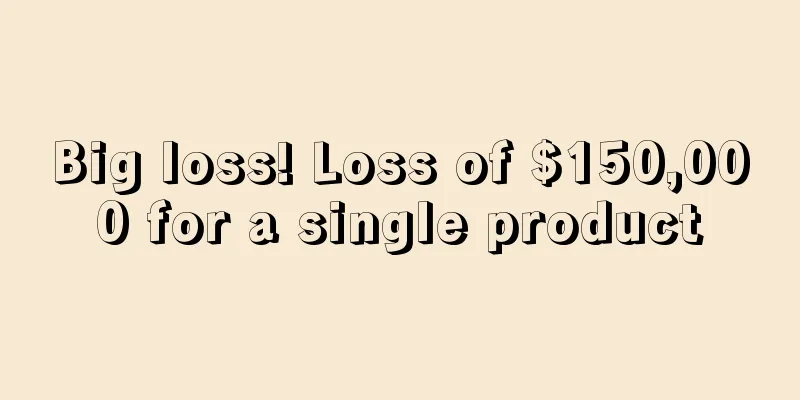Big loss! Loss of $150,000 for a single product

|
Here it comes again, check yourself quickly!
Well-known IP cannot be touched, and it costs $150,000 to touch it
According to foreign media reports, Sesame Workshop, a well-known American children's education organization , has filed another lawsuit, accusing some sellers on e-commerce platforms such as Amazon, Walmart and eBay of selling counterfeit goods that are suspected of copyright infringement, and demanding $150,000 in compensation for each infringing work .
The lawsuit was filed in the Northern District Court of Illinois, and the e-commerce platforms covered also include eCRATER, MadeInChina , Temu and other Chinese overseas e-commerce platforms .
The lawsuit documents pointed out that the unscrupulous sellers on the defendant list created multiple fake stores, took advantage of the anonymity of the Internet and the convenience of cross-border operations, and sold a large number of unauthorized goods.
By carefully designing the store pages, the appearance and design elements of the counterfeit products are highly similar to the genuine products, thereby misleading consumers and greatly damaging the brand reputation of Sesame Street Workshop.
Not only that, the sales and sales of Sesame Street Workshop's genuine products have been affected. It emphasizes that all its products have registered relevant trademarks and copyrights worldwide .
The characters known to be affected include Elmo , Big Bird, Cookie Monster, Grover, Bert and Ernie, all classic characters with extremely high brand recognition .
In 1968, the Children's Television Workshop ( CTW) was established in the United States . Its first TV program, Sesame Street, was broadcast on the National Educational Television and several commercial television stations in New York. Since then, CTW has successively launched programs such as "The Electric Company" and "3-2-1 Connection", and has also launched local versions of "Sesame Street" in Brazil, Mexico, Germany and other countries. In 2000, CTW was renamed Sesame Workshop .
To date, Sesame Workshop's business has expanded to include program production, educational services, and peripheral products such as toys and clothing , and has been well received by the market.
Precisely because of this, its IP characters have been repeatedly infringed.
Last October, Sesame Workshop also commissioned Tme Law, PC, to conduct intellectual property law protection for multiple trademarks and copyrights under its name, and many sellers became defendants.
The trademark and copyright registration numbers involved at that time were 2891251 , 3470662, 3479148, 3603326, 1025725, 1027429, 1082622, 1082535, 1895976, 1110963, 1240243, 2248851, 2711703, 954372, 1056651, 959284, 1046044, 1046043, 1056652, 3942072, 473927 0, 3972337, 2646137, 3319583, 3665227, 7006944, 3633098, 3110646, 3604268, 5871312, 3825629, 4511604, 2994747, 3291435, 2830142, 3437796, 3946809, 2992170, 3478191, 6521804, 7026248, 2140480, etc., up to 40+ .
To this end, Sesame Workshop requires relevant e-commerce platforms to immediately stop selling all unauthorized counterfeit goods and take stricter measures to curb infringements, otherwise it will seek financial compensation to compensate for the losses of brands and consumers.
Chinese sellers included in defendant list
In addition to Sesame Street Workshop, a home furnishing company recently filed a lawsuit, demanding that the defendant pay $150,000 (per piece) in compensation for counterfeiting its original products .
On February 25, American home design company JJ DESIGN HOUSE LLC commissioned the law firm FERENCE & ASSOCIATES LLC He filed a lawsuit to protect his original copyrighted painting, which was accepted by the Pennsylvania Court of the United States with the case number 25-cv-00275.
On March 5, the Pennsylvania Court in the United States released this copyright infringement lawsuit , which mentioned that multiple sellers, especially Chinese sellers, sold products that plagiarized its design elements and creativity through cross-border e-commerce platforms. These products were highly similar to its original works, and the core elements such as patterns and colors were highly overlapped . They were not imitations, but direct plagiarism.
Not only the sellers, JJ DESIGN HOUSE LLC also emphasized that platforms such as Amazon have not effectively intercepted these counterfeit products, and have also provided them with distribution channels, so the platforms need to bear joint and several liability .
At present, in addition to requesting the court to issue a TRO injunction to the defendants and requiring the defendants to stop selling and remove the products from the shelves, JJ DESIGN HOUSE LLC also claimed economic compensation: requiring the defendants to calculate the total amount based on the statutory compensation standard of up to US$150,000 per item and bear the plaintiff's attorney fees and other litigation costs .
JJ DESIGN HOUSE LLC holds the copyrights for a series of home decoration designs created by artist Jessie Gagatko, covering multiple categories such as wall art and furniture. There are a total of 7 copyrights involved in this case . According to the lawsuit documents, as many as 142 sellers have become defendants .
The lawsuit also cited an industry survey, indicating that counterfeit sellers would use AI image capture technology to track popular products in Europe and the United States in real time, complete the entire chain of counterfeit design, production and cross-border logistics within 72 hours, and use the price difference between the Chinese and American markets to make huge profits . This model caused the monthly sales of original products on the Amazon platform to drop by 47%.
Sellers who often pay attention to cross-border product infringement know that copyright painting infringement is one of the most "popular" infringement methods, and cases are emerging in an endless stream.
For example, in the past week: Gerald J.Lofaro's GERALD animal fantasy illustrations were infringed, case number 25-cv-01952; Florian Usseglio's fantasy illustrations were infringed, case number 25-cv-01904; Jan Patrick's historical fantasy illustrations were infringed, case number 25-cv-01907; Jason Heuser 's humorous historical illustrations were infringed, case number 25 -cv-01905 , etc.
Chinese people gather to defend their rights
In addition to the above-mentioned infringement cases of major IPs and copyrighted paintings, there have recently been a series of intellectual property protection cases initiated by Chinese sellers regarding common products.
1. Artificial Plant
In February, Chinese seller Amborui Electronic Tech.Co., Ltd. filed a lawsuit in Illinois, USA, alleging infringement of its artificial flowers. The case number is 25-cv-01466.
By using polymer materials such as PE, PVC, and PU to imitate outdoor real flowers and other real plant designs, Amborui Electronic Tech.Co., Ltd.'s simulated plants are almost indistinguishable from the real ones in terms of leaves, colors, and textures, and are very popular among home decoration enthusiasts. The product under protection this time is the product with patent number USD1052445S.
Currently, there are more than 40,000 listings of artificial plants on Amazon, with monthly sales starting from thousands and even reaching tens of thousands.
2. Automatic Animal Door
In January, Chinese seller Xiong Li filed an infringement lawsuit in Virginia, USA, with case number 2025-cv-00047 .
Unlike ordinary animal doors, Xiong Li's products have a certain degree of intelligence. They use solar charging technology and have a built-in intelligent light sensor and timer system, which can automatically arrange entry and exit times according to the activity patterns of animals. Users can easily adjust the opening and closing time of the automatic door through manual settings to ensure that animals can enter and exit safely at the scheduled time without having to pay attention all the time. It is portable and environmentally friendly .
This product has a US invention patent with the patent number US12082559B1, which was issued in September 2024. Currently, there are 85 stores involved in the case, with nearly 100 ASINs of the products involved, and some sellers' stores have been frozen by TRO.
3. MILIPOP/MRTREUP trademark
In February, Chinese seller Chengliang Wang protected his trademark in Illinois, USA, with case number 25-cv-01614.
Since entering the cross-border circle, the seller has been focusing on various home furnishings, children's products, beauty and other tracks. He also registered the MRTREUP and MILIPOP trademarks in the United States in 2019 and 2021 respectively.
The case information is currently sealed, but it can be seen from the trademark documents that MILIPOP registration number is 6627086, registered in Class 28, including puppets, dolls and their toy sets, children's electronic games, etc.; MRTREUP registration number is 6012361, registered in Class 3, including adhesives for fixing false eyelashes; bath salts, etc.
There are still many new product patents being issued, and sellers need to check themselves from time to time and do a good job of copyright work. product compensation |
<<: It’s about Amazon’s peak season traffic! Sellers find a way out
>>: Crazy sales of 8 billion! Shanghai's big sellers made a fortune in the niche market
Recommend
Sales soared 2315%! These are the hottest products on Easter
Easter is a very important festival in the West, ...
What is MediaWorld? MediaWorld Review, Features
Media World is the first Italian non-food distrib...
What is StarReader Technology? StarReader Technology Review, Features
Xingyue Technology is a comprehensive innovative ...
Small toys carry big risks, and multiple e-commerce platforms have urgently removed them from shelves!
Children's safety issues cannot be ignored. R...
What is Zero? Zero Review, Features
Zero Quit Smoking with a Plan That's Right for...
What is Pinkoi? Pinkoi Review, Features
Pinkoi is from Taiwan and is Asia's leading o...
What is Yingkai International Freight Forwarding? Yingkai International Freight Forwarding Review, Features
Guangzhou Yingkai International Freight Forwarding...
Shopping shifts from physical to virtual, social e-commerce value to reach $120 million
The emergence of social media has changed the way...
What is Elizabeth Arden? Elizabeth Arden Review, Features
Elizabeth Arden is a beauty brand established in t...
To improve search rankings, sellers can refer to these five content optimization strategies!
Content optimization refers to the process of upd...
The holiday shopping season is coming! A guide for merchants posting on Instagram
With less than 100 days left until Christmas 2021...
Latest! Multiple platforms have issued announcements to support sellers with business difficulties
Shenzhen resumes work, multiple warehouses resume...
Children's magnet products caused accidents and a Chinese seller was investigated!
Children's products have always been consider...
British seaports are severely congested and there may be a shortage of holiday toys!
At present, the global supply chain crisis is sti...
Its subsidiary owes sellers 900 million yuan, and the parent company has set its sights on Wish!
Recently, the fact that two well-known Korean e-c...









